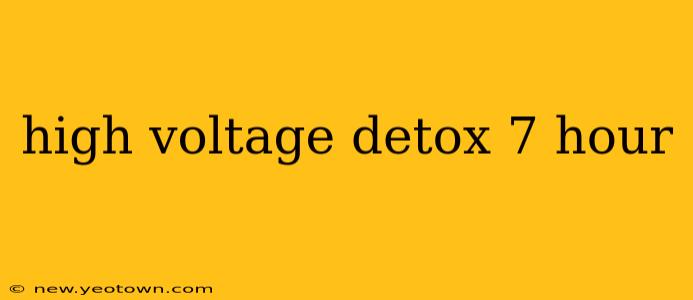The High-Voltage Detox: 7-Hour Journey to Cellular Renewal? A Deep Dive
The promise of a "high-voltage detox" in just seven hours sounds almost too good to be true, doesn't it? Imagine, shedding toxins and feeling revitalized in a single day. This intriguing concept has sparked curiosity, but understanding its true nature requires a closer look. Let's unravel the science, the hype, and the realities of this purported rapid detox method.
This isn't about a literal high-voltage electrical shock, thankfully! Instead, "high-voltage" often refers to the intensity or effectiveness of the detoxification process, implying a powerful and rapid effect. The methods used to achieve this often involve a combination of approaches aimed at supporting the body's natural detoxification systems. But does a 7-hour timeframe realistically deliver on the promises? Let's explore.
What is a "High-Voltage Detox"? Understanding the Concept
The term "high-voltage detox" doesn't represent a standardized medical procedure. It's more of a marketing phrase often associated with intensive detoxification programs that employ various methods to accelerate the body's natural cleansing processes. These may include:
- Intensive Hydration: Drinking copious amounts of water, often infused with electrolytes, to flush out toxins.
- Nutritional Cleansing: Following a strict diet emphasizing fruits, vegetables, and other nutrient-rich foods to support liver and kidney function. This often involves eliminating processed foods, sugar, and caffeine.
- Colonic Hydrotherapy (Colonics): A procedure involving the flushing of the colon with water, aimed at removing waste material. (Note: The effectiveness and safety of colonics are debated within the medical community.)
- Supplements: Using various supplements purported to aid detoxification, such as antioxidants, liver support formulas, or probiotics. It's crucial to consult a healthcare professional before using any supplements.
The "7-hour" aspect likely refers to a concentrated, intensive program designed to deliver noticeable results within a relatively short timeframe.
Does a 7-Hour Detox Actually Work? Separating Fact from Fiction
The idea of completely detoxifying your body in just seven hours is a significant oversimplification. The body's detoxification process is a complex, ongoing function involving several organs, primarily the liver and kidneys. While a short-term intensive program can support this process, it's unrealistic to expect a complete elimination of all toxins in such a limited time.
What a 7-hour program might achieve is a temporary boost in the elimination of some waste products. The increased hydration and improved diet could contribute to feelings of increased energy and improved well-being. However, lasting, significant detox effects require a sustained, holistic approach to lifestyle and dietary changes.
What are the potential risks associated with a rapid detox?
While many people experience no adverse effects, a 7-hour high-voltage detox, particularly one involving colonics or strong supplements, might carry some risks. These can include:
- Dehydration: If you consume too much water without balancing electrolytes, you could experience dangerously low sodium levels (hyponatremia).
- Electrolyte imbalances: These imbalances can lead to muscle cramps, weakness, or even heart problems.
- Nutrient deficiencies: Restricting food groups too drastically could result in nutritional deficiencies.
- Adverse reactions to supplements: Some supplements can interact with medications or trigger allergic reactions.
Are there safer, more effective ways to detox?
Instead of seeking a rapid fix, focus on long-term sustainable habits that naturally support detoxification:
- Hydration: Drink plenty of water throughout the day.
- Balanced Diet: Consume a diet rich in fruits, vegetables, and whole grains.
- Regular Exercise: Physical activity supports healthy organ function.
- Stress Management: Chronic stress can negatively impact detoxification processes.
- Adequate Sleep: Proper sleep allows the body to repair and regenerate.
Always consult your doctor or a registered dietitian before starting any new detox program, especially if you have underlying health conditions or are taking medications.
What are the different types of detox diets?
There are many different approaches to detoxification, each with its own set of principles and restrictions. These can range from juice cleanses to more balanced, whole-foods-based plans. The effectiveness and suitability of each type vary widely, depending on individual needs and health status.
How long does it typically take to detoxify the body?
There's no single answer to this question as it depends on individual factors like lifestyle, diet, and overall health. The detoxification process is ongoing, not a one-time event. Consistent healthy habits are key for optimal body cleansing.
Can detox help with weight loss?
While some detox programs might lead to short-term weight loss due to fluid loss and restricted calories, sustainable weight loss requires a long-term commitment to a balanced diet and regular exercise. The focus should be on nourishing your body, not just shedding weight quickly.
In conclusion, while the idea of a 7-hour high-voltage detox is enticing, it's crucial to approach such claims with a healthy dose of skepticism. Focusing on long-term, sustainable healthy habits is a far more effective and safe approach to supporting your body's natural detoxification processes. Remember to consult healthcare professionals for personalized advice before embarking on any significant dietary or lifestyle changes.

